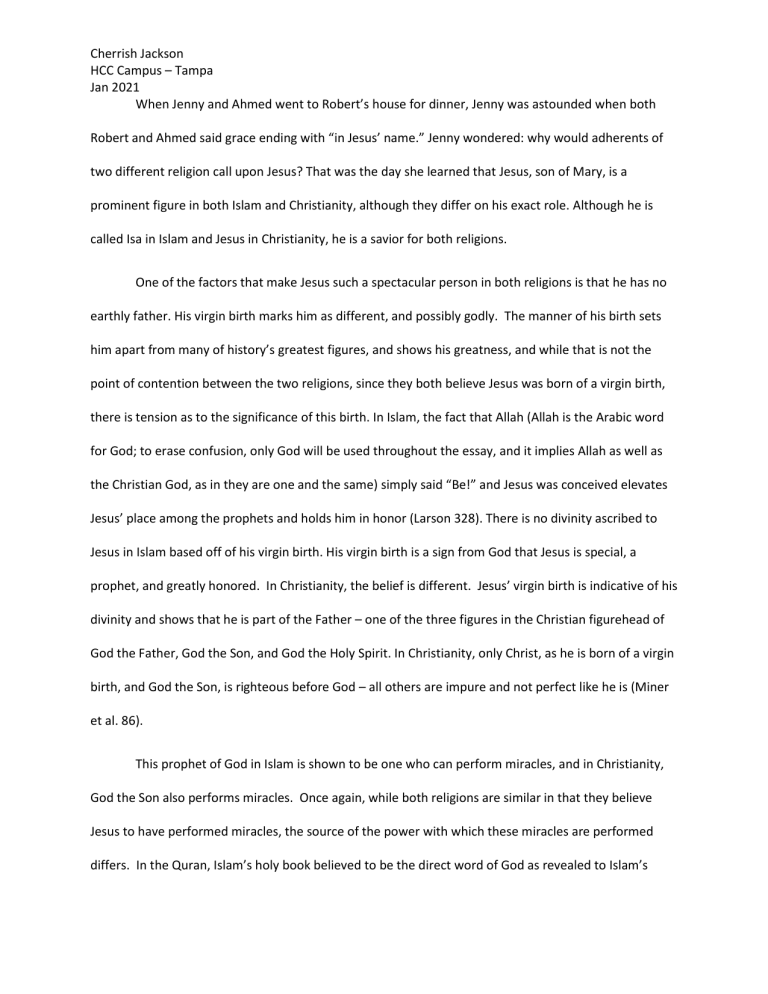
Cherrish Jackson HCC Campus – Tampa Jan 2021 When Jenny and Ahmed went to Robert’s house for dinner, Jenny was astounded when both Robert and Ahmed said grace ending with “in Jesus’ name.” Jenny wondered: why would adherents of two different religion call upon Jesus? That was the day she learned that Jesus, son of Mary, is a prominent figure in both Islam and Christianity, although they differ on his exact role. Although he is called Isa in Islam and Jesus in Christianity, he is a savior for both religions. One of the factors that make Jesus such a spectacular person in both religions is that he has no earthly father. His virgin birth marks him as different, and possibly godly. The manner of his birth sets him apart from many of history’s greatest figures, and shows his greatness, and while that is not the point of contention between the two religions, since they both believe Jesus was born of a virgin birth, there is tension as to the significance of this birth. In Islam, the fact that Allah (Allah is the Arabic word for God; to erase confusion, only God will be used throughout the essay, and it implies Allah as well as the Christian God, as in they are one and the same) simply said “Be!” and Jesus was conceived elevates Jesus’ place among the prophets and holds him in honor (Larson 328). There is no divinity ascribed to Jesus in Islam based off of his virgin birth. His virgin birth is a sign from God that Jesus is special, a prophet, and greatly honored. In Christianity, the belief is different. Jesus’ virgin birth is indicative of his divinity and shows that he is part of the Father – one of the three figures in the Christian figurehead of God the Father, God the Son, and God the Holy Spirit. In Christianity, only Christ, as he is born of a virgin birth, and God the Son, is righteous before God – all others are impure and not perfect like he is (Miner et al. 86). This prophet of God in Islam is shown to be one who can perform miracles, and in Christianity, God the Son also performs miracles. Once again, while both religions are similar in that they believe Jesus to have performed miracles, the source of the power with which these miracles are performed differs. In the Quran, Islam’s holy book believed to be the direct word of God as revealed to Islam’s Cherrish Jackson HCC Campus – Tampa Jan 2021 prophet, Muhammad, Jesus is said to have performed many miracles, including healing lepers, giving the blind the ability to see, and raising the death. The Quran makes it very clear that Jesus can perform these miracles only through the power of God, that God has given him that ability, and without God’s specific help, he could not, of his own person, performed these miracles. In Christianity, because Jesus is God the Son, he has the power to create these miracles just because he is God, and he does not need any power outside his own to make these miracles. This belief solidifies and bolsters the claim of Jesus’ divinity because only the Divine can make such acts come about. A man who can raise the dead would surprise no one if he, himself, arose from the dead. But the Muslims do not ascribe to the belief that Jesus has even died yet, let alone to have risen from the dead. In Islam, Jesus, son of Mary, God’s Prophet, has not died. Muslims believe that Jesus was not killed by the Jews, but that “[o]n the day of the crucifixion another person - whether his disciple or his betrayer was miraculously transformed and assumed the appearance of Jesus. He was taken away, crucified, and killed, while Jesus was assumed body and soul into heaven”(Reynolds). In Christianity, however, Jesus was killed on cross and rose after the third day. Jesus’ crucifixion holds a very important part in Christianity because it represents the salvation that Jesus provides for Christians. Christianity contends that because of this crucifixion, the blood that was shed by Jesus is accepted by God as atonement of the sins of the believes of Jesus. It is in the torture, humiliation, and crucifixion that he underwent that makes Jesus the Christ, the Savior of the world. One of the most famous Biblical passages “For God so loved the world, that he gave his only begotten Son, that whosoever believeth in him should not perish, but have everlasting life” (John 3:16), attests to the fact that Christianity’s belief that Jesus had to die for salvation to be attained. The core beliefs of Islam and Christianity when it pertains to Jesus, Son of Mary, are very similar, but the differences are found in the details. While the shape is the same, the contours paint a picture of Cherrish Jackson HCC Campus – Tampa Jan 2021 a different character in Jesus, and any outside observer would be confused as to how these two religions can have such similar views on the core of who Jesus was, but so different in the interpretation and significance of these characteristics. Islam teaches that Jesus’ significance derives only through the benevolence of God – it is only because God has made him special that he had a virgin birth, is able to perform miracles, and did not face an unjust and humiliating death. On the other hand, in Christianity, the essence of Jesus’ being, the fact that he is the God the Son that all these things come about. In Christianity, Jesus is the cause of virgin birth, the miracles and the need for his believers to attain salvation through is blood when he is crucified. While not exactly the riddle of what came first, the chicken or the egg, these differences in the perception of Jesus between Islam and Christianity do beg the question of whether Jesus is the cause, or the means of the cause: does he have these characteristics because he is needed, or does the characteristics exist only because he does. Cherrish Jackson HCC Campus – Tampa Jan 2021 Works Cited Larson, Warren. “Jesus in Islam and Christianity: Discussing the Similarities and the Differences.” Missiology, vol. 36, no. 3, SAGE Publications, 2008, pp. 327–41, https://doi.org/10.1177/009182960803600305. Miner, Maureen, et al. “Spiritual Attachment in Islam and Christianity: Similarities and Differences.” Mental Health, Religion & Culture, vol. 17, no. 1, Jan. 2014, pp. 79–93. EBSCOhost, https://doi.org/10.1080/13674676.2012.749452. Reynolds, Gabriel Said. “The Muslim Jesus: Dead or Alive?” Bulletin of the School of Oriental and African Studies, vol. 1, no. 2, Cambridge University Press, 2009, pp. 22–258, https://doi.org/10.1017/S0041977X09000500.





